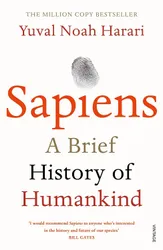This book is an examination and discussion of the history of the species Homo Sapiens, also known as human beings. This is the species that I belong to and presumably you do too. The book takes a journey through human history, from our beginnings as one of many Homo species, to the global dominance we have today.
The book talks about an idea called the “Cognitive Revolution”, which is a time in the past when some change occurred in our brains to allow us to think more abstractly, to plan for the future, and to develop art and culture. Harari makes the case that this was the defining moment in our species, and that once the Cognitive Revolution began, culture became the primary driving force behind our behaviour. So this is not a book that talks much about our biology, or our existence as animals. Our deeper, more animal behaviour patterns are not discussed and so the implication is that these no longer matter much in our behaviour, and that culture is now dominant.
Several big cultural ideas are discussed, such as agriculture, money, religion, science, empire and capitalism. For each of these big cultural ideas, the book describes how these ideas came to exist and how they were developed. For example, it explains how agriculture may have started because the collection of grains by hunter gatherers led to seeds being dropped and germinating near the camps of hunter gatherer tribes. The book takes a journey through human history, with these big ideas assumed to be the driving force, explaining how things changed as these ideas developed and spread.
Harari doesn’t shy away from the negative aspects of any of these ideas. The negative consequences of empires and colonisation are discussed frankly. As another example, it’s understood that the development of agriculture led to much harder physical work, and a poorer, more limited diet compared to a hunter gatherer lifestyle. But it was more successful from the perspective of producing and supporting more humans, so societies that adopted agriculture outcompeted those that didn’t, and eventually took over the lands that they were using for hunting and gathering. Many of the ideas in the book are like this: major downsides but ultimately more successful than what went before.
The book covers the development of science. It makes the case that one of the factors leading to the development of science was the admission of ignorance. Cartographers used to invent things for areas of the world that no-one had explored, rather than admitting ignorance, and it was also assumed that religious texts contained everything we needed to know. Once humans began to admit that they didn’t know things, it set the stage for science to become a discipline that could start to fill in the blanks of our knowledge. The author’s conjecture that science only exists (and gets funded) to gain power for governments and corporations was a bit depressing, though.
In fact, in general, I found this to be a slightly depressing book to read. Even the author acknowledges as much in his final chapter, where he takes stock of our achievements so far and discusses the future powers we may gain through science and technology.
Unfortunately, the Sapiens regime on earth has so far produced little that we can be proud of.
If you are expecting and hoping for something a little more scientific, you may be disappointed. While this ‘big idea’ view of history is well-written, and does have some explanatory power for the world we inhabit today, it still feels largely like just the author’s opinions. I don’t fully agree with the idea that we can simply ignore our biological heritage or animal instincts when discussing our behaviour or history, even if the big cultural ideas discussed in this book play a major role. So while it’s an interesting read, it ultimately left me rather unsatisfied.
